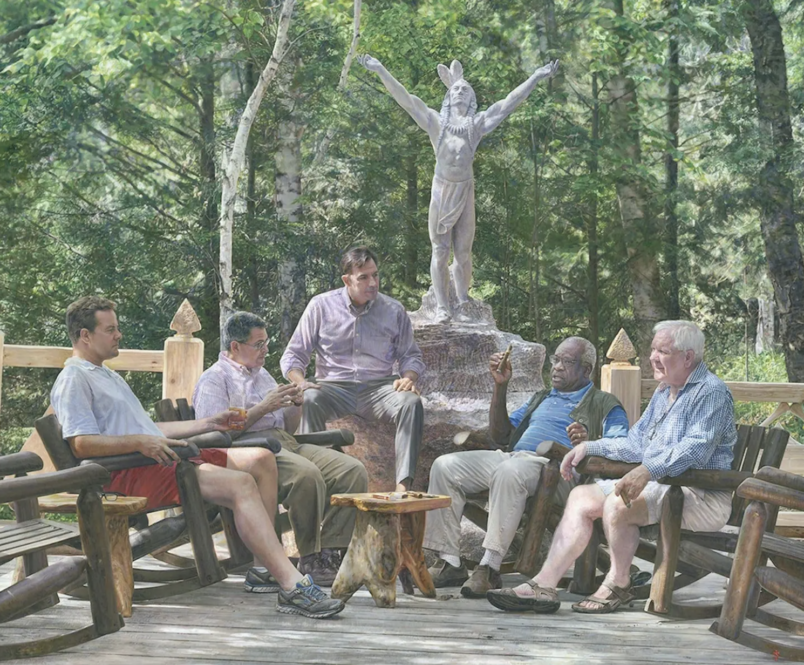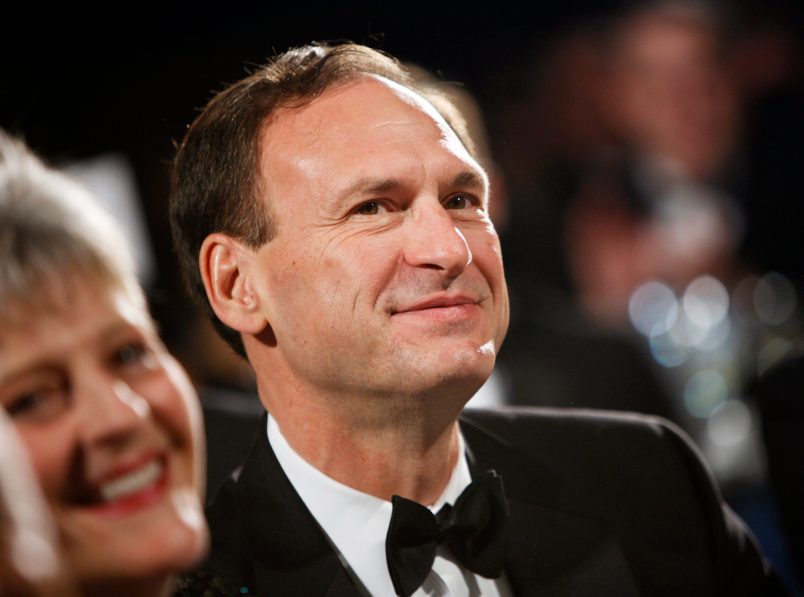You’ve likely seen that TPM Alum Justin Elliott and the team at ProPublica is back with another big exclusive about the Supreme Court. This time, for once, Clarence Thomas is in the clear. Now we’re talking about the intemperate and peevish Sam Alito who took an all expenses paid fishing trip to Alaska back in 2008, courtesy of hedge fund billionaire Paul Singer. In a characteristic move, Alito refused to respond to the reporters’ questions and then published his answers as an op-ed in The Wall Street Journal in a kind of prebuttal and attack. Because yes, he’s that guy.
The bulk of the story is a detailed run-down of what Alito did, what a justice needs to disclose and what kind of high-powered gifts should dictate a recusal in cases where Singer had some direct stake — there’ve been a number. But the gem in Alito’s prebuttle op-ed is the explanation of the private jet flight.
As for the flight, Mr. Singer and others had already made arrangements to fly to Alaska when I was invited shortly before the event, and I was asked whether I would like to fly there in a seat that, as far as I am aware, would have otherwise been vacant. It was my understanding that this would not impose any extra cost on Mr. Singer. Had I taken commercial flights, that would have imposed a substantial cost and inconvenience on the deputy U.S. Marshals who would have been required for security reasons to assist me.
Alito seems to suggest that he was flying to Alaska and it turned out Singer happened to be flying to Alaska too. And he happened to have a spare seat on his private jet. So what sense would there be in having the seat go to waste? In the spirit of the Alaskan wilderness, taking the seat was sort of a resource-conservation effort in which Alito was lending a hand.
But of course Singer didn’t just happen to going to Alaska. He was going to Alaska specifically to spend quality time with Sam Alito. The whole thing had been arranged by The Federalist Society’s Leonard Leo, who asked Singer if he and Alito could fly up with him on his private jet.
And here’s where the whole picture starts to come into focus — both the Alito story and the Thomas ones. Needless to say, none of these billionaires are just old friends in the sense you or I might recognize. But they didn’t just glom on to their justice on their own. Everyone here is part of Leo’s network. Harlan Crow is a big Republican donor but also a big Federalist Society donor. So is Paul Singer. So is the owner of the fishing lodge. In fact, Leo’s network is so vast and deep-pocketed that eventually he decided he was too big for the Federalist Society and struck out on his own. Indeed last year he secured a record-breaking $1.6 billion donation as a kind of judicial corruption grubstake to fund all his future endeavors.

As I said, the full picture starts to come into focus. Somewhat like some colleges or the service academies match a sponsor family with first-year students or cadets, Leo seemed to do that with incoming Supreme Court justices. You know … a place to stay over the holidays, watch a movie, get emotional support, a place to take a nap on an off day. It’s basically that: a sponsor family for each new justice.
As we’ve noted before, there’s a long arc of the Federalist Society’s role placing justices on the Court. Thomas, now the oldest member of the Court, appointed in 1991, is old enough to have had a partly organic rise within the judicial ranks. He’s as much a part of the creation and maturation of the Federalist Society as one of its creations. By the time you get to a Brett Kavanaugh you’re talking about someone who was basically grown in a test tube for the specific purpose of one day serving on the Supreme Court.
We focus a lot on the pipeline the Federalist Society created to place ideologically true justices first on the appellate courts and then finally on the Supreme Court. What gets much less focus and what these stories highlight is the way the justices are essentially kept by the Federalist Society and the sponsor families once they ascend to the Court. It makes you wonder: which families got assigned to Neil, Brett and Amy?
In any case, it’s probably wrong to see this too much in transactional terms. Certainly, all of these lavish gifts should be reported and the justices should recuse themselves when cases arise dealing with their “close friends.” But the larger issue is the way the justices remain “kept” in perpetuity by the right-wing activist donor network that placed them on the Court in the first place. Sugar Justices, if you will.
Unlike an earlier generation of Republican appointees, most of these justices are confirmed ideologues. They don’t need a lot of tending. But the logic — albeit an increasingly poor one — of lifetime appointments is that the justices are free of pressure or any need to curry favor. They have a true independence which allows them to look to issues beyond political alignment or personal favor. But clearly that’s not the case. While it’s not the root of the problem, what we see here — the sponsor families, the kept justices — is an essential part of the corruption of the current Supreme Court.






